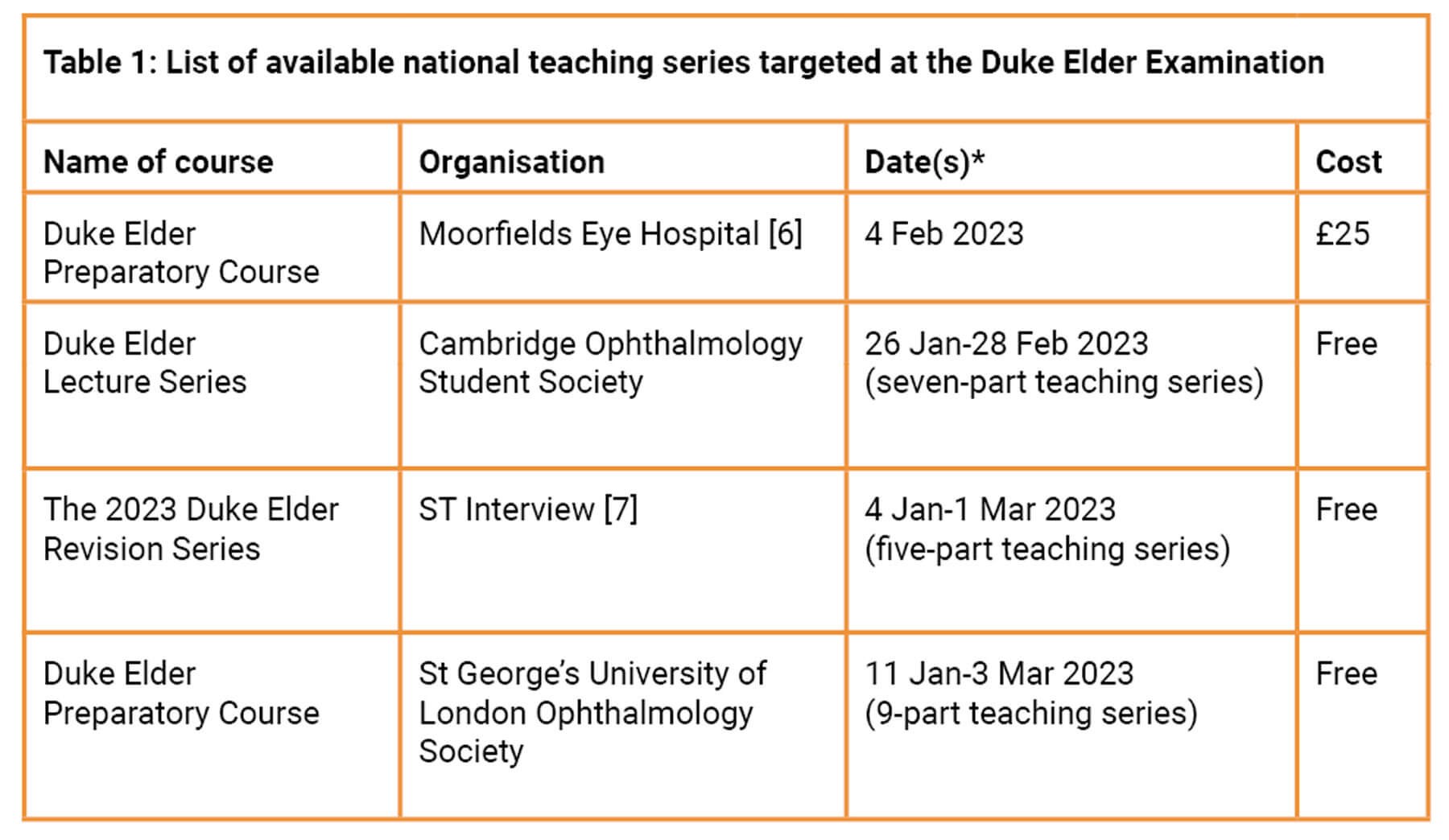
The Duke Elder undergraduate prize examination is an annual exam organised by the Royal College of Ophthalmologists in the United Kingdom. Named after Sir Stewart Duke Elder, a prominent British ophthalmologist, the exam is designed to encourage undergraduate medical students to take an interest in ophthalmology and to reward outstanding performance in the subject.

Regarded as the largest and most coveted undergraduate prize exam in the UK, the Duke Elder is known for its notoriously rigorous requirements, beyond the ophthalmic knowledge expected from the undergraduate medical curriculum. Recently opened to medical students worldwide, candidates may expect stiffer competition in upcoming years. As a third-year medical student with little prior exposure to ophthalmology, this article shares my thoughts and recent experience in preparing for the Duke Elder exam from scratch.
A foundational knowledge of ophthalmology
I kickstarted my Duke Elder preparation four months before the exam with Lecture Notes Ophthalmology (2016), a textbook by Bruce James [1]. This textbook encapsulates information on the various ophthalmic sub-specialties alongside basic sciences related to ophthalmology – all highly relevant to the Duke Elder exam. This was a fitting starting point to begin as it offers a clear elucidation of intricate terminology with the aid of visual imagery to enhance understanding. Additionally, it is not overly demanding, comprising of approx. 300 pages and in fact quite an engaging read, enabling one to gradually establish momentum in their Duke Elder preparation.
The concise nature of the textbook, contrasting with the traditional, lengthy medical textbooks one may typically encounter, presents a refreshing change and a breath of fresh air whilst preparing for the exam. To illustrate, I was able to finish reading the entire book within a span of two weeks. This approach significantly contributed to the development of a sound foundation of knowledge and comprehension in the field of ophthalmology for me, before challenging myself with question banks. In addition, this establishes a reasonable standard from the offset, instead of blindly diving into a sea of question banks which can be overwhelming and discouraging for students.
Practice makes perfect
Next, I relied on the Duke Elder exam question bank by Eyedocs to gain a flavour of the style of questioning used [2]. The questions in Eyedocs are highly challenging and not to be trifled with, however I found that they were synonymous to the standard expected in the real exam. Initially, I scored within the range of 30-40% for the first few sets of questions and with sustained perseverance, I observed a gradual and substantial improvement in my performance and scores, averaging 70% and even up to 90% on good days. The question bank served as an important way to gauge both the breadth and depth of my knowledge on ophthalmic conditions.

*The dates provided are derived from the schedules of the most recent courses conducted for the Duke Elder Examination in 2023 and may be subjected to changes by the respective organisers in subsequent years.
Alongside the question bank, I utilised supplementary resources such as the Kanski’s textbook on clinical ophthalmology [3] and the EyeWiki website [4] to learn about ophthalmic conditions in greater detail than I had come across in the question bank. Anki also came in handy in consolidating high-yield ophthalmology facts that I found challenging or hard to memorise [5].
Attending national Duke Elder teaching series
Typically commencing in January and February, several virtual Duke Elder teaching series are organised annually by both undergraduate ophthalmology societies and eye hospitals. Selecting the right ones optimal for Duke Elder preparation requires a fair bit of scrutiny on each teaching series’ design as well as the timing of the teaching series relative to your Duke Elder preparation. Ideally, a good teaching series for Duke Elder should include speakers which are previously successful entrants in their Duke Elder examination sittings. This is a pertinent point as it suggests that the information taught will more likely be in line with the style and standard of the Duke Elder.
I attended two teaching courses both running in February: a six-part teaching series by the Cambridge Ophthalmology Society as well as a one-day Duke Elder Preparatory Course by Moorfields Eye Hospital. Prior to the courses, I had completed approximately two months of revision before attending them. As such, this allowed me to participate actively, keep up with the pace of the teaching and served well in consolidating my knowledge of ophthalmology. However, if there was only one course I could choose in retrospect, it would be the Duke Elder Preparatory Course.
“Early planning for your exam preparation is a crucial step that is often overlooked”
Offering a day-long course that comprehensively covers most aspects of the exam, a key fact information sheet and a question bank, I would highly encourage any prospective Duke Elder entrants to go for this course in preparation for the examination. With the course normally occurring a month before the exam, it offered new impetus for me on how I can further finetune, augment and sharpen my ophthalmic knowledge to better prepare for sitting it.
Final thoughts and takeaways
Lastly, early planning for your exam preparation is a crucial step that is often overlooked, as is evident from recurring narratives shared by my colleagues who failed to achieve their desired results. It remains salient to recognise that the Duke Elder exam is undertaken additionally alongside one’s medical school commitments in the midst of the academic year. Early preparation is essential to make the necessary revisions to your Duke Elder preparation plans to account for concurrent academic obligations and to minimise exam letdown. With ophthalmology regarded as a highly competitive specialty in the UK, boasting 8.97 applicants per place in 2022 [8], the Duke Elder examination serves as a primer of ophthalmology for medical students to gain a better picture of ophthalmology as a specialty and demonstrate evidence of a commitment to ophthalmology.
References
1. James B, Bron A, Parulekar MV. Lecture Notes: Ophthalmology, 12th Edition. New Jersey, US; Wiley-Blackwell; 2016.
2. Eyedocs. Duke-Elder Exam.
https://www.eyedocs.co.uk/
duke-elder-exam-info
3. Karpecki PM. Kanski’s Clinical Ophthalmology: A Systematic Approach, 8th ed. Optom Vis Sci 2015;92(10):e386.
4. EyeWiki.
https://eyewiki.org/Main_Page
5. Anki.
https://apps.ankiweb.net
6. Moorfields Education. Duke Elder preparatory course.
https://checkout.moorfields.nhs.uk/
product?catalog=Duke-Elder
7. Stinterview. The 2023 Duke Elder Revision Series.
https://stinterview.com/dukeelder/
8. NHS Health Education England. Competition ratios for 2022.
https://medical.hee.nhs.uk/medical-training
-recruitment/medical-specialty-training/
competition-ratios/2022-competition-ratios
[All links last accessed April 2023]
Declaration of competing interests: None declared.
COMMENTS ARE WELCOME






